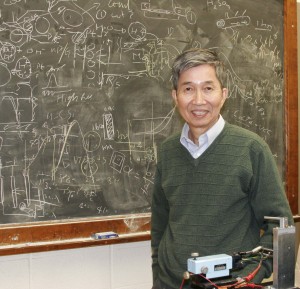
UR Professor of Chemical Engineering Ching Tang was awarded the illustrious Wolf Prize on Wednesday, Feb. 15. Drue Sokol - Photo Editor
On the morning of Wednesday, Feb. 15, UR Professor of Chemical Engineering Ching Tang had no idea he was nominated for the Wolf Prize. A phone call from Israel then came in, and he was announced as the recipient of the prestigious award in the field of chemistry given annually by the Wolf Foundation.
Tang shared the 2011 prize with Professor Stuart Alan Rice of the University of Chicago and Professor Krzystof Matyjaszewski of Carnegie Mellon University. The three men were recognized for their creative contribution to chemical sciences in the field of synthesis, properties and an understanding of organic materials.
In Tang’s case, the award is for his discovery of the organic light-emitting diode (OLED), which is quickly replacing LCD displays in smart phones, computers and televisions. He is hailed as the father of this multi-billion-dollar industry.
“In the Eastman Kodak Research Laboratory, where I spent 31 years as a researcher, my proudest achievement was the discovery of what is now known as the organic heterojunction,” Tang said.
Today, this forms the basis of the scientific field of organic electronics and is used in technologies such as OLEDs, organic solar cells and transistors.
Nevertheless, Tang’s work is not yet done. He is currently developing thin-film solar cells for the conversion of sunlight to electricity at an affordable cost and further improving his brainchild, the OLED, for advanced display and applications.Tang joined the UR faculty in fall 2006 and became the first to hold the position of Doris Johns Cherry Professor. He also has joint appointments in in the Department of Physics and Astronomy.
“My training was actually in physical chemistry, but my research interest has always been in applying chemistry and physics to practical and engineering applications,” Tang said. “Chemical engineering fits nicely in my disciplines.”
Despite his reputation as the leading figure in display technology, Tang continues to teach and do research at the University. He particularly enjoyed teaching his graduate courses, Organic Electronics and Solar Cells.
When asked what about the environment at the University that draws him to it, he cited the liberal arts factor that has given him the opportunity to interact with faculty members and students from all disciplines. Widely considered second in standing to the Nobel Prize, the Wolf Prize has produced 14 Nobel Prize winners in the past 33 years.
The award will be given out by the President of Israel and the Israeli Minister of Education at a special ceremony held at Knesset on May 29.
Lim is a member of
the class of 2014.




